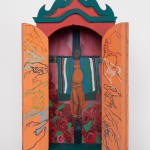Yanaki Herrera
Embarazo, 2022
acrílica sobre oratório de madeira
[acrylic on wooden oratory]
[acrylic on wooden oratory]
63 x 37 x 17 aberto
63 x 28 x 17 fechado
[24 3/4 x 14 5/8 x 6 3/4 in open
24 3/4 x 11 x 6 3/4 in closed]
3.8 kg
63 x 28 x 17 fechado
[24 3/4 x 14 5/8 x 6 3/4 in open
24 3/4 x 11 x 6 3/4 in closed]
3.8 kg
Further images
“A maternidade retratada na série Wawawasi oscila entre a relação dicotômica da mulher mártir e a virgem. A presença das violências visíveis e invisíveis que atravessam uma mulher grávida. A...
“A maternidade retratada na série Wawawasi oscila entre a relação dicotômica da mulher mártir e a virgem. A presença das violências visíveis e invisíveis que atravessam uma mulher grávida. A complexidade simbólica de um corpo que sangra-alimenta e morre-nasce em um preciso instante. A serenidade de quem nina a criança e sangra ao mesmo tempo. O sacrifício de quem sustenta a sobrecarga. Todas essas colocações são reveladas por meio das imagens. Ao abrir as portas dos oratórios, mantém-se um desejo altamente intimista, secreto, mas que logo convida a uma quebra de expectativa.
Os suportes da série Wawawasi costuram uma relação entre os Retablos Ayacuchanos e os Oratórios Itinerantes feitos no estado de Minas Gerais. Ainda que feitos em cidades distantes, ambos compartilham marcas semelhantes do colonialismo e vem se transformando ao longo da história, adquirindo novos recursos estéticos e conceituais. Considero que os Retablos Ayacuchanos transgridem a função inicial dos oratórios, o que me motiva a explorar principalmente a representação da mulher nestes lugares de reza.”
Yanaki Herrera
[“The motherhood portrayed in the Wawawasi series oscillates between the dichotomous relationship of the woman martyr and the virgin. The presence of visible and invisible violence that crosses a pregnant woman’s existence. The symbolic complexity of a body that bleeds-feeds and dies-is born in a precise instant. The serenity of someone who cradles the child and bleeds at the same time. The sacrifice of those who sustain the overload. All these placements are revealed through the images. When opening the doors of oratories, a highly intimate, secret desire remains, but which soon invites for a breach of expectation.
The supports of the Wawawasi series create a relationship between the Ayacucha Altarpieces and the Itinerant Oratory made in the state of Minas Gerais. Although made in distant cities, both share similar marks of colonialism and have been transformed throughout history, acquiring new aesthetic and conceptual references. I believe that the Ayacucha altarpieces transgress the original function of oratories, which motivates me to explore mainly the representation of women in these places of prayer.”]
Yanaki Herrera
Os suportes da série Wawawasi costuram uma relação entre os Retablos Ayacuchanos e os Oratórios Itinerantes feitos no estado de Minas Gerais. Ainda que feitos em cidades distantes, ambos compartilham marcas semelhantes do colonialismo e vem se transformando ao longo da história, adquirindo novos recursos estéticos e conceituais. Considero que os Retablos Ayacuchanos transgridem a função inicial dos oratórios, o que me motiva a explorar principalmente a representação da mulher nestes lugares de reza.”
Yanaki Herrera
[“The motherhood portrayed in the Wawawasi series oscillates between the dichotomous relationship of the woman martyr and the virgin. The presence of visible and invisible violence that crosses a pregnant woman’s existence. The symbolic complexity of a body that bleeds-feeds and dies-is born in a precise instant. The serenity of someone who cradles the child and bleeds at the same time. The sacrifice of those who sustain the overload. All these placements are revealed through the images. When opening the doors of oratories, a highly intimate, secret desire remains, but which soon invites for a breach of expectation.
The supports of the Wawawasi series create a relationship between the Ayacucha Altarpieces and the Itinerant Oratory made in the state of Minas Gerais. Although made in distant cities, both share similar marks of colonialism and have been transformed throughout history, acquiring new aesthetic and conceptual references. I believe that the Ayacucha altarpieces transgress the original function of oratories, which motivates me to explore mainly the representation of women in these places of prayer.”]
Yanaki Herrera
In the gallery
Looking Back to Walk Forth | Bienal de Veneza - Pavilhão Bolívia | Veneza | 2024 [20.04 - 24.11]Tal Como Sementes | A Gentil Carioca | São Paulo | Brasil | 2023 [26.08 - 23.09]













